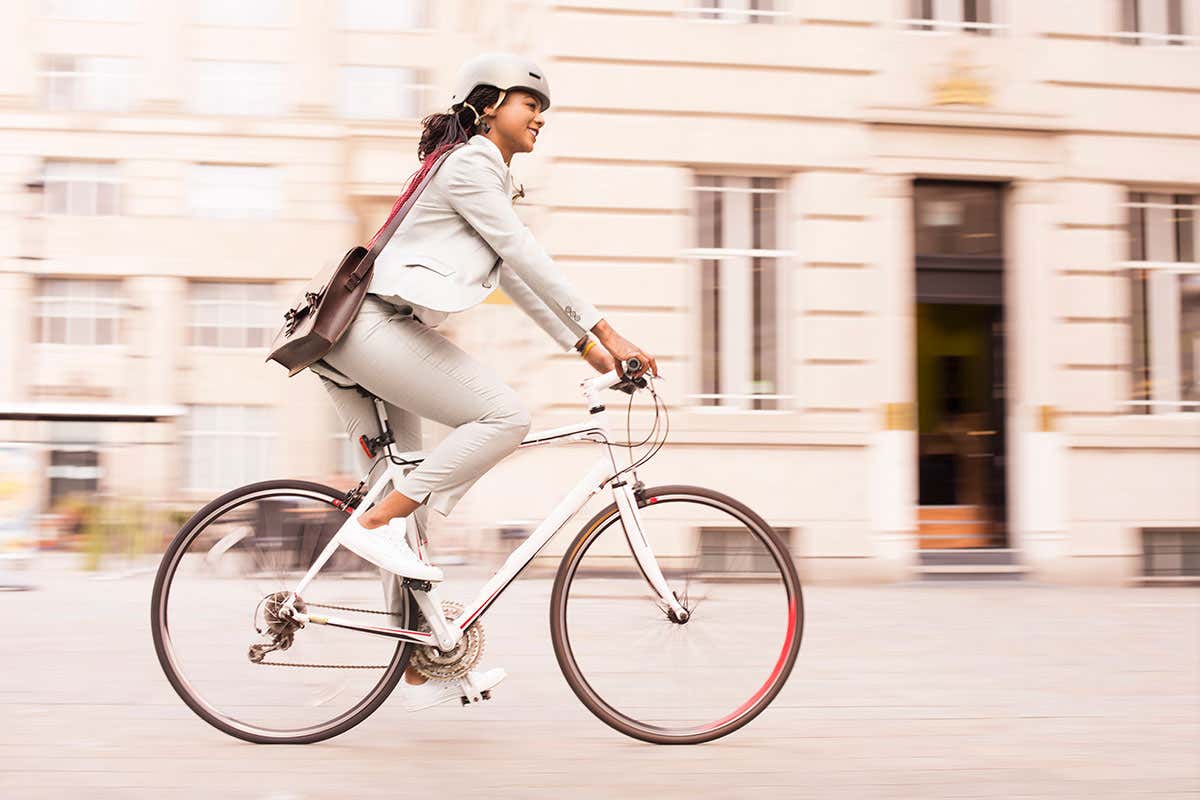The new study, which looked at outcomes over 10 years, shows those fears aren’t unreasonable – commuting by bike is associated with an increased risk of admission to hospital for injury, with 7 per cent of cyclists experiencing such an injury compared to 4.3 per cent of non-cyclists. Squint a bit, and you can turn that into the “50 per cent more likely” figure mentioned above.
But Paul Welsh at the University of Glasgow in the UK, who led the study and who cycles himself, says the risk of death from cycling injury is vanishingly small. In fact, it is far outweighed by the decreased risk of death that comes from the increased physical activity and lower BMI of cyclists. “The data are still very much in favour of cycling for those who are capable of doing so,” says Welsh.
Cyclists have a far lower risk of cardiovascular disease, cancer and death compared with people who drive, take public transport or walk to work – a finding supported by this and previous studies. If an extra 1000 people took up cycling for 10 years, we would expect to see 15 fewer cancers, four fewer heart attacks or strokes and three fewer deaths in that group.
Sometimes, people online and in real life ask why I complain about unsafe or lacking bicycle infrastructure but continue to put myself at risk by cycling. Is it worth it? Yes it is. Even from the perspective of self-preservation, cycling is safer than driving. I’d just like it to be even safer, and make it so that more people can benefit.
The reality is that the majority of people will die from LIFESTYLE RELATED ILLNESS, not cycling.
If cycling can help to prevent or lower the risk of those illnesses, then it’s worth it. And that’s only benefit 1 of 1000 😁
That’s a great way to put it.
I started commuting on bike last year and I do worry about being injured, so it’s a relief seeing that the health-benefits outweigh that risk.
Yeah this reassured me too. Especially because the benefit doesn’t seem to be small, but overwhelmingly in favour of cycling even with the increased risk of accidents.
I think the largest caveat to this article’s claim is that it’s very dependent on the local environment. The UK has better biking infrastructure than the vast majority of the United States, where bike lanes are mostly a suggestion.
Indeed, the US is unfortunately a huge outlier. These charts comparing the US to other countries are shocking. The US is apparently one of the only developed countries that have gotten less safe in the last few years for non-drivers.
It’s especially egregious when you consider that Canada has less than half the accident rate, despite similar city design. Canadian cities are getting safer for cyclists every year.
That said, if you live in a place with good biking infrastructure in the US, I suspect it’s still worth it to bike.
Yeap my city started putting in bike lanes last year, but a lot of it was done by turning a two lane street into a single. People just ignored the new paint and continued driving on the bike path, so they attempted erecting those flimsy reflectors. People literally just ran them over enough to destroy them.
But my city may be an outlier, I do live in the most conservative state in the union. We have had several people run over and murder cyclists for simply existing.
live in a place with good biking infrastructure in the US, I suspect it’s still worth it to bike.
Surprisingly Minneapolis is probably one of the nicest cities for commuting via bike I’ve ever been too. Prob the only city I’ve been to in the US that feels safer for bikes than the UK.
Thanks for posting. I cycle everywhere even though I am also terrified of getting hit by a car. My brother’s friend got killed that way. One thing that the statistics don’t tell you is that you can reduce your chances of injury by being super careful. Look all around you, assume that every car on the road is trying to kill you, and do your best not to even get into their path whenever you can avoid it. If you see a motorist driving dangerously in your vicinity, just get off the road. That on top of all the normal advice like, you know, always wear a helmet, don’t cycle at night without lights, etc.
That’s my thought too. My friends and acquaintances who cycle the most haven’t had a single accident in years. Defensive cycling is a skill.
It’s like that line from gun safety: “Every gun is loaded.” Every car will not stop or follow the rules. They will blow through stop signs and lights. Turn without looking. If you treat every car that way and adjust your trajectory and speed accordingly, the chance of an accident is tiny.
Many towns have put money and effort into bike/pedestrian paths. Using those I can usually avoid a majority of car traffic. Actively choosing less traffic’d routes should also improve safety.
in the UK
Don’t get your hopes up, fellow americans, it doesn’t hold true over here. A truck bumper is more likely than a heart attack here.
That’s possible, but yours is a separate empirical claim. Do you have a source for that? Absence of evidence is not evidence of absence. As the article notes, the health benefits in the UK are overwhelming, so even with the increased risk of accidents in the US, it may still end up being worth it.
It should also be noted that the risks of a sedentary life are probably also much higher in the US than the UK, because it’s so much more car-centric. Obesity and other health metrics are much worse in the US, so the benefits of cycling might be all that much higher. I would want to see some evidence instead of guessing.
I could show you the roads I’d have to ride down. 12 miles one way, all of it along narrow two lane roads with no sidewalk, no breakdown lane, no bicycle lane. And it’s full of those comically large trucks they have in the US, each of them driven by a guy who thinks his dick will rot off if he slows down below 65 mph.
I’ll ride on weekends and keep going to the gym instead.
I believe you that your personal trip isn’t worth it. But you claimed that “it doesn’t hold true over here”, which is a bold claim that’s not just about your personal situation, which you’re declaring without any evidence.
Um, anyone else who tries to ride a bicycle to work in my area is going to have the same issue, so Im not sure what your arguing.
OK, agreed. Please edit your original comment to say “Don’t get your hopes up, fellow people who bicycle to work in my area”
Maybe after yours is edited to reflect reality.
deleted by creator
Surprisingly, the positives of bike exercise seem to outweigh the harms of breathing in even extreme air pollution. Here is a BBC article on the topic.
“Even in Delhi, one of the most polluted cities in the world - with pollution levels 10 times those in London - people would need to cycle over five hours per week before the pollution risks outweigh the health benefits,” said Dr Marko Tainio, the lead author of the study.
deleted by creator
Yes, separate bike trails away from roads keep bicyclists from enhaling vehicle emissions, but it also reduces the likelihood of car on bicycle collisions. Can’t hit what you can’t reach.
From what I read, this even holds true for crazy stuff like downhill MTB and BMX: The health benefits outweigh the injury risk.
this sounds like reverse lottery. a high probability of minor gains with a miniscule chance of serious negative outcome.
I don’t know, the health gains seem VERY substantial, not minor. I think biking even a moderate amount, 2 or 3 times a week, would be literally life changing for most Americans and Canadians. And this isn’t even counting the gains to mental health, happiness, and finances.
and the losses from playing lotto week after week, year after year add up. I’m meaning individual instances, you don’t get ripped after one rep.
I get the sense that in the wake of a collision, it’s uncouth to suggest a cyclist victim broke the road rules in the circumstances of their accident; so if you have fears of being hit by an SUV during your commute, you probably help your odds quite a bit just by stopping at red lights.
It’s uncouth partially because it’s simply not as likely that the cyclist broke the rules.
But also, even if a cyclist did break some road rules, they should be allowed to sometimes. This is like “jaywalking”, which doesn’t really exist outside North America. When a cyclist makes a mistake, people don’t usually die, receive life ruining injuries, or suffer significant property damage. In fact, many places allow cyclists to treat stop signs as yield signs precisely because it’s actually safer if cyclists have some leeway to make their own decisions.
Road rules are mostly to protect everyone from cars. Cars make streets dangerous, and it’s misleading to shift the blame to cyclists.





